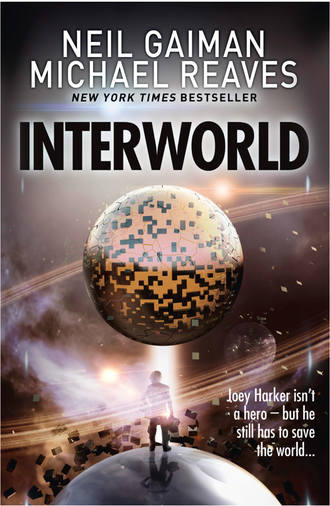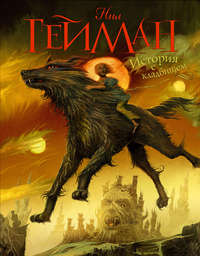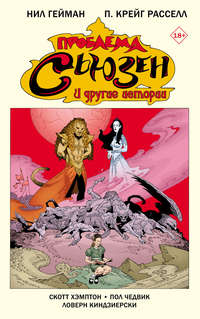
Полная версия
Interworld
It had my face.

THE STRANGER WAS WEARING a full-face mask of some kind, and the surface of it was mirrored, like mercury. It was the strangest thing, staring into that blank, silvery face and seeing my own face staring back at me, all bent and distorted.
My face looked goofy and dumb. A liquid map of freckles, a loose mop of reddish-brown hair, big brown eyes and my mouth twisted into a cartoonish mixture of surprise and, frankly, fear.
The first thing I thought was that the stranger was a robot, one of those liquid metal robots from the movies. Then I thought it was an alien. And then I began to suspect that it was someone I knew wearing some kind of a cool high-tech mask, and it was that thought that grew into a certainty, because when he spoke, it was with a voice I knew. Muffled by the mask enough that I couldn’t place it, but I knew it, all right.
“Joey?”
I tried to say “Yeah?” but all I could manage was some kind of noise in my throat.
He took a step toward me. “Look, this is all happening a bit fast for you, I imagine, but you have to trust me.”
All happening a bit fast? Understatement of the decade, dude, I wanted to tell him. My house wasn’t my house, my family wasn’t my family, my girlfriend wasn’t my girlfriend—well, she hadn’t been from the start, but this was no time to get finicky. The point was that everything stable and permanent in my life had turned to Jell-O, and I was about this far from losing it completely.
Then the weirdo in the Halloween mask put his hand on my shoulder, and that closed the gap between losing and lost. I didn’t care if he was someone I knew. I jerked my knee up, hard, just as Mr. Dimas had told us all to do—boys and girls—if we ever thought we were in physical danger from a male adult. (“Don’t aim for the testicles,” said Mr. Dimas that day, just as if he were discussing the weather. “Aim for the center of his stomach, as if you’re planning to get there through the testicles. Then don’t stop to see if he’s okay or not. Just run.”)
I practically broke my kneecap. He was wearing some kind of armor under the coat.
I yelped in pain and clutched my right knee. What made it worse was that I knew that behind the mirrored mask, the creep was smiling.
“You okay?” he asked in that half-familiar voice. He sounded more amused than concerned.
“You mean apart from not knowing what’s going on, losing my family and breaking my knee?” I would have run, but fleeing for one’s life requires two legs in good operating condition. I took a deep breath, tried to pull it together.
“Two of those things are your own stupid fault. I was hoping to get to you before you started Walking, but I wasn’t fast enough. Now you’ve set off every alarm in this region by crossing from plane to plane like that.”
I had no idea what he was talking about; I hadn’t been on a plane since the family saw Aunt Agatha for Easter. I rubbed my leg.
“Who are you?” I said. “Take off the mask.”
He didn’t. “You can call me Jay,” he said. Or maybe it was, “You can call me J.” He put out his hand again, as if I were meant to shake it.
I wonder if I would have shaken it or not—I never got to find out. A sudden flash of green light left me blinded and blinking, and, a moment later, a loud bang momentarily put my ears out of commission, too.
“Run!” shouted Jay. “No, not that way! Go the way you came. I’ll try to head them off.”
I didn’t run—I just stood there, staring.
There were three flying disks, silver and glittering, hovering in the air about ten feet away. Riding each disk, balancing like a surfer riding a wave, was a man wearing a gray one-piece outfit. Each of the men was holding what looked like a weighted net—like something a fisherman might have, it occurred to me, or a gladiator.
“Joseph Harker,” called one of the gladiators in a flat, almost expressionless voice. “Opposition is nonproductive. Please remain where you are.” He waved his net to emphasize his point.
The net crackled and sparked tiny blue sparks where the mesh touched. I knew two things when I saw those nets: that they were for me, and that they were going to hurt if they caught me.
Jay shoved me. “Run!”
This time, I got it. I turned and took off.
One of the men on the disks shouted in pain. I looked back momentarily: He was tumbling down to the ground while the disk hovered in the air above him. I suspected that Jay was responsible.
The other two gladiators were hanging in the air directly above me, keeping pace with me as I ran. I didn’t have to look up. I could see their shadows.
I felt like a wild beast—a lion or a tiger, maybe— on a wildlife documentary, being hunted by men with tranquilizer darts. You know that it’s going to be brought down, if it just keeps running in a straight line. So I didn’t. I dodged to the left, just as a net landed where I had been. It brushed my right hand as it fell: My hand felt numb and I could not feel my fingers.
And I moved.
I was not sure how I did it, or even what I had just done. I had a momentary impression of more fog and twinkling lights and the sounds of wind chimes, and then I was alone. The men in the sky were gone—even mysterious Mr. Jay with the mirror face was nowhere to be seen. It was a quiet October afternoon, wet leaves were sticking to the sidewalk and nothing was happening in sleepy Greenville as per usual.
My heart was thumping so hard I thought my chest was going to burst.
I walked down Maple Road, trying to catch my breath, rubbing my numb right hand with my left, trying to get a handle on what had just happened.
My house wasn’t my house any longer. The people who lived there weren’t my family. There were bad guys on flying manhole covers after me, and a guy with an armored crotch and a mirrored face.
What could I do? Go to the police? Suuure, I told myself. They hear stories like this one all the time. They send the people who tell them stories like that to the funny farm.
That left one person I could talk to. I came around the curve in the street and saw Greenville High in front of me.
I was going to talk to Mr. Dimas.

GREENVILLE HIGH SCHOOL WAS built nearly fifty years ago. The city closed it when I was a kid for a few months to remove the asbestos. There are a couple of temporary trailers out in the back that house the art rooms and the science labs, and will do until they get around to building the new extension. It’s kind of crumbling; it smells like damp and pizza and sweaty sports equipment—and if I don’t sound like I love my school, well, I guess that’s because I don’t. But I had to admit it made me feel pretty good to be there now.
I made it up the steps, keeping a wary eye on the sky for gladiators on flying disks. Nothing.
I walked inside. Nobody gave me a second glance.
It was the middle of fifth period, and there weren’t too many people in the halls. I headed for Dimas’s classroom as fast as I could without running. He’d never been my favorite teacher—those bizarre tests he came up with were hard—but he’d always impressed me as someone who wouldn’t lose his head in an emergency.
If this wasn’t an emergency, I didn’t know what was. And it was his fault, in a way, wasn’t it?
I didn’t quite run down the corridor until I got to his classroom. I looked through the glass of the door. He was sitting at his desk, marking a stack of homework papers. I knocked on the door. He didn’t look up, just said “Come!” and kept on marking.
I opened the door and went over to his desk. He kept his eyes on the papers.
“Mr. Dimas?” I tried to keep my voice from shaking. “Do you have a moment?”
He looked up, looked into my eyes, and he dropped his pen. Just dropped it, like that. I bent down, picked it up and put it back on his desk.
I said, “Is there something wrong?”
He looked pale and—it took me a few moments to recognize this—actually frightened. His jaw dropped. He shook his head in the way my dad always called “shaking out the cobwebs” and looked at me again. He held out his right hand.
Then he said, “Shake my hand.”
“Uh, Mr. Dimas . . . ?” I was suddenly seized by the fear that he was part of all this weirdness, too, and the thought frightened me so that I could barely keep standing. I needed someone to be the adult right now.
He still held his hand out. His fingers were shaking, I noticed. “You look like you’ve seen a ghost,” I told him.
He looked at me sharply. “That’s not funny, Joey. If you are Joey. Shake my hand.”
I put my hand in his. He squeezed it just short of painfully, feeling the flesh and the bones of it, then he let go and looked up at me. “You’re real,” he said. “You aren’t a hallucination. What does this mean? Are you Joey Harker? You certainly look like him.”
“Of course I’m Joey,” I said. I’ll admit it—I was ready to start bawling like a baby. This madness, whatever it was, couldn’t be affecting him as well. Mr. Dimas was always so sane. Well, kind of sane. When Mayor Haenkle described him in his column in the Greenville Courier as “crazy as a snowblower in June” I pretty much knew what he meant.
But I had to tell someone what was going on, and Mr. Dimas still seemed like the best choice.
“Look,” I said carefully, “today has gone . . . really weird. You’re the only person I thought could maybe handle it.”
He was still as pale as a pitcher of milk, but he nodded. Then there was a knock on the door and he said, “Come!” He sounded relieved.
It was Ted Russell. He hardly even glanced at me. “Mr. Dimas,” he said. “I got a problem. If I get an F in Social Studies it means I don’t get a car. And I figure you’re going to give me an F.”
Apparently some things even alternate realities couldn’t change; Ted was obviously still grade challenged. Mr. Dimas had looked disappointed when Ted came in; now he was annoyed. “And why exactly is this my problem, Edward?”
That was the Mr. Dimas I remembered. I felt relieved, and before I could think the better of it, I had already spoken. “He’s right, Ted. Anyway, keeping you off the road is a public service. You’re a five-car pileup waiting to happen.”
He turned on me, and I hoped that he wasn’t going to hit me in front of Mr. Dimas. Ted Russell likes to hit people smaller than him, and that takes in a big chunk of the school population. He raised a hand—then he saw it was me.
He stopped, hand in the air, and said, plain as day, “Mother of God, it’s a judgment on me,” and started to cry. Then he ran out of the room. He ran like I had run earlier. It’s called running for your life, I thought.
I looked at Mr. Dimas. He looked back, then hooked one foot around a nearby chair leg and dragged the chair toward me. “Sit,” he told me. “Put your head down. Breathe slow.”
I did. Good thing, too, because the world—or at least his office—had gone kind of wobbly. After a minute things steadied, and I raised my head. Mr. Dimas was watching me.
He walked out of the room, returned a few seconds later with a paper cup. “Drink.”
I drank the water. It helped. A little. “I thought I was having a weird day before. Now it’s somewhere out beyond bizarre. Can you explain any of this to me?”
He nodded. “I can explain a little of it, certainly. At least, I can explain Edward’s reaction. And mine. You see, Joey Harker drowned last year in an accident down at Grand River Falls.”
I grabbed my sanity and held on with both hands. “I didn’t drown,” I told him. “I got pretty shaken up, and I had to have four stitches in my leg, and Dad said that would teach me a lesson I’d never forget, and that trying to go over the falls in a barrel was the single stupidest thing I’d ever tried, and I told him I wouldn’t have done it if Ted hadn’t said I was chicken. . . .”
“You drowned,” said Mr. Dimas flatly. “I helped pull your body out of the river. I spoke at your memorial service.”
“Oh . . .” We both were quiet then for a moment, until the quiet got to be too much and I had to say something. So I said, “What did you say?” Well, wouldn’t you have asked the same thing, if you were me?
“Nice things,” he said. “I told them you were a good-hearted kid, and I told them how you got lost all the time in your first semester here. How we’d have to send out search parties to get you safely to Phys. Ed. or the science trailers.”
My cheeks were burning. “Great,” I said with all the sarcasm I could muster. “That’s just how I’d want to be remembered.”
“Joey,” he asked gently, “what are you doing here?”
“Having a weird day—I told you.” And I was going to explain it all to him—and I bet he would have figured out some of it—but before I could say anything else, the room began to go dark. Not dark as in, the sun went behind a cloud dark, or dark as in, hey, that’s a mighty scary thunderstorm dark, or even dark as in, I’ll bet this is what a total eclipse of the sun looks like. This was dark like something you could touch, something solid and tangible and cold.
And there were eyes in the middle of the darkness.
The darkness formed itself into a shape. It was a woman. Her hair was long and black. She had big lips, like it had been fashionable for movie stars to have back when I was a kid; she was small and kind of thin, and her eyes were so green she had to have been wearing contacts, except she wasn’t.
They looked like a cat’s eyes. I don’t mean they were shaped like cat’s eyes. I mean they looked at me the way a cat looks at a bird.
“Joseph Harker,” she said.
“Yes,” I said. Which was probably not the smartest thing I could’ve said, because then she laid a spell on me.
That’s the best way I can explain it. She moved her finger in the air so that it traced a figure—a symbol that looked a little bit Chinese and a little bit Egyptian—that hung glowing in the air after her finger finished moving, and she said something at the same time; and the word she said hung and vibrated and swam through the room; and the whole of it, word and gesture, filled my head; and I knew I had to follow her for all my life, wherever she went. I would follow her or die in the attempt.
The door opened. Two men came in. One was wearing just a rag, like a diaper around his middle. He was bald—in fact, as near as I could tell, he was completely hairless, and that, with the diaper, made him look like a bad dream even without the tattoos. The tats just made it worse: They covered every inch of his skin from hairline to toenails; he was all faded blues and greens and reds and blacks, picture after picture. I couldn’t see what they were, even though he wasn’t more than five feet away.
The other man was wearing a T-shirt and jeans. The T-shirt was a size too small, which was really too bad, because it left a big stretch of stomach exposed. And his stomach . . . well, it glistened. Like a jellyfish. I could see bones and nerves and things through his jelly skin. I looked at his face, and it was the same way. His skin was like an oil slick over his bones, muscles and tendons; you could see them, wavery and distorted, beneath it.
The woman looked at them as if she’d been expecting them. She gestured casually at me. “Got him,” she said. “Like taking ambrosia from an elemental. Easy. He’ll follow us anywhere now.”
Mr. Dimas stood up and said, “Now, listen here, young lady. You people can’t—” and then she made another gesture and he froze. Or kind of. I could see his muscles trembling, as if he were trying to move, trying with every cell of his being, and still failing.
“Where’s the pickup?” she asked. She had a kind of Valley Girl accent, which I found irritating, particularly since I knew I was going to have to spend the rest of my life following her around.
“Outside. There’s a blasted oak,” said the jellyfish man in a voice like belching mud. “They’ll take us from there.”
“Good,” she said. Then she looked at me. “Come along,” she told me in a voice that sounded like she was talking to a dog she didn’t particularly like. She turned and walked away.
Blindly, obediently, I followed her, hating myself with every step.

From Jay’s Journal
I’d got back to Base Town late at night. Most of the folk in my dorm were asleep, except Jai, and he was meditating, suspended in midair with his legs crossed, so he might as well have been sleeping. I crept around, undressed and showered for twenty minutes, getting the mud and dried blood out of my hair. Then I filled out the damage & loss report, explaining how I’d lost my jacket and belt (I traded the jacket for information, and the belt had made a pretty effective tourniquet, if you must know). Then I crashed like a dead man and slept till I woke.
It’s a tradition. You don’t wake a guy when he gets back from a job. He gets a day to debrief, and then a day to himself. It’s kind of sacrosanct. But sacrosanct goes out the window when the Old Man calls, and there was a note beside my bunk when I awoke, on the Old Man’s orange paper, telling me to report to his office at my convenience, which is his way of saying immediately.
I pulled on my gear and I headed for the commander’s office.
There are five hundred of us on the base, and every single one of us would die for the Old Man. Not that he’d want us to. He needs us. We need us.
I knew he was in a foul mood when I reached the anteroom. His assistant waved me into his office as soon as she saw me coming. No “hello,” not even an offer of coffee. Just “He’s waiting. Go on in.”
The Old Man’s desk takes up most of the room, and it’s covered with piles of paper and dog-eared folders held together with rubber bands. Heaven only knows how he finds anything on there.
On the wall behind him there’s a huge picture of something that looks kind of like a whirlpool and kind of like a tornado and mostly like the shape the water makes as it goes down the drain. It’s an image of the Altiverse—the pattern that we all swore to protect and to guard and, if needed, to give our lives for.
He glared at me with his good eye. “Sit down, Jay.”
The Old Man looks to be in his fifties, but he could be much older than that. He’s pretty banged up. One of his eyes is artificial: it’s a Binary construct, made of metal and glass. Lights flicker inside it, green and violet and blue. When he looks at you through it, it can have you checking out your conscience and make you feel five years old every bit as well as his real eye can. His real eye is brown, just like mine.
“You’re late,” he growled.
“Yes, sir,” I said. “I came as soon as I got your message.”
“We have a new Walker,” he told me. He picked up a file from his desk, riffled through it and pulled out a sheet of blue paper. He passed it to me. “Upstairs thinks he could be hot.”
“How hot?”
“Not sure. But he’s a wild card. Going to be setting off alarms and tripping snares everywhere he goes.”
I looked at the paper. Basic human-friendly planet design— one of the middle worlds, the thick part of the Arc—nothing too exotic. The coordinates were pretty straightforward as well. It looked like a fairly easy run.
“Reel him in?”
The Old Man nodded. “Yeah. And quickly. They’ll both be sending out grab teams to get him as soon as they know he’s out there.”
“I’m meant to be debriefing the Starlight job today.”
“Joliet and Joy are debriefing now. If I need any amplification I can get in touch with you. This takes priority. And you can have two days off when it’s done.”
I wondered if I’d actually get the two days off. It didn’t matter. “Got it. I’ll bring him in.”
“Dismissed,” said the Old Man. I stood up, figuring on a quick trip to the armory and then out into the field and into the In-Between. Before I reached the door, though, he spoke again. He was still growling at me, but it was a friendly growl. “Remember, Jay, I need you back here in one piece, and I need you back here soon. One more Walker, more or less, isn’t going to mean the end of the worlds. One less field officer might. Stay out of trouble. You’ll be back and debriefing by oh seven hundred hours tomorrow.”
“Yes, sir,” I said, and closed the door.
The Old Man’s assistant handed me my armory requisition slip. Then she smiled at me. Her name’s Josetta. “Goes for me, too, Jay,” she said. “Come back safe. We need all the field ops we can get.”
The quartermaster is from one of the heavier Earths—places where you feel like you weigh five hundred pounds, and often do. He’s shaped like a barrel, ten inches taller than I am. Looking at him is like looking into a distorting mirror at a carnival, the kind that squashes you as it magnifies you.
I requisitioned an encounter suit, watched him toss it down to me like it didn’t weigh anything at all. I caught it, and it almost knocked me over. It must have weighed seventy-five pounds. I figured he was mad at me for losing the combat jacket and the belt.
I signed for the encounter suit. I stripped down to my T-shirt and boxers, draped it over me and activated it, feeling it cover my body from head to toe; and then I set my mind on the new kid. I got a bead on him and began to Walk toward him. . . .
The In-Between was cold, and it tasted like vanilla and woodsmoke in my mouth. I found him without a hitch. And then it all went wrong.

I WAS WALKING AFTER the witch, with Mr. Jellyfish and the tattooed man just behind me.
It was like two people were living in my head. One of them was ME, a big huge me, who had somehow decided that the most important thing there ever was or would be was the witch woman he was following out of the high school. The other person in my head was me, too, but a tiny little me who was screaming silently, who was terrified of the witch and the tattooed man and Mr. Jellyfish, who wanted to run, to save himself.
Trouble was, the little me was having no effect whatsoever. We crossed the football field, heading toward the old oak tree, which had been struck by lightning a couple of years back and now just stuck up into the sky like a rotten tooth. The sun had just gone down, but the sky was still light. I was shivering.
The witch turned to the tattooed man. “Scarabus, contact the transport.”
He bowed his head. I could see goose bumps on his skin under one of those not-quite-clear images. He raised a finger and touched it to one of the tattoos on his neck, and suddenly I could see that one clearly. It was a ship under sail. He closed his eyes. When he opened them, the pupils were glowing gently.
“The ship Lacrimae Mundi at your bidding, lady,” he said in a distant voice like a radio broadcast.
“I have our quarry safely here. Bring her in, captain.”
“As you wish,” said the tattooed man, in the distant voice. Then he closed his eyes and took his hand off his tattoo; and when he opened his eyes, they were normal once more. “What’s the word?” he asked in his normal voice.
“They’re bringing her in now,” said the jellyfish man. “Look!”
I raised my head.
The ship—it seemed as big as the auditorium—that was materializing in the air in front of us looked like every pirate ship you’ve ever seen in old movies: stained wooden planks, big billowing sails, and a figurehead of a man with the head of a shark. It was gliding toward us about five feet above the ground, and the green grass of the football field tossed back and forth like the surface of the sea as it passed.











